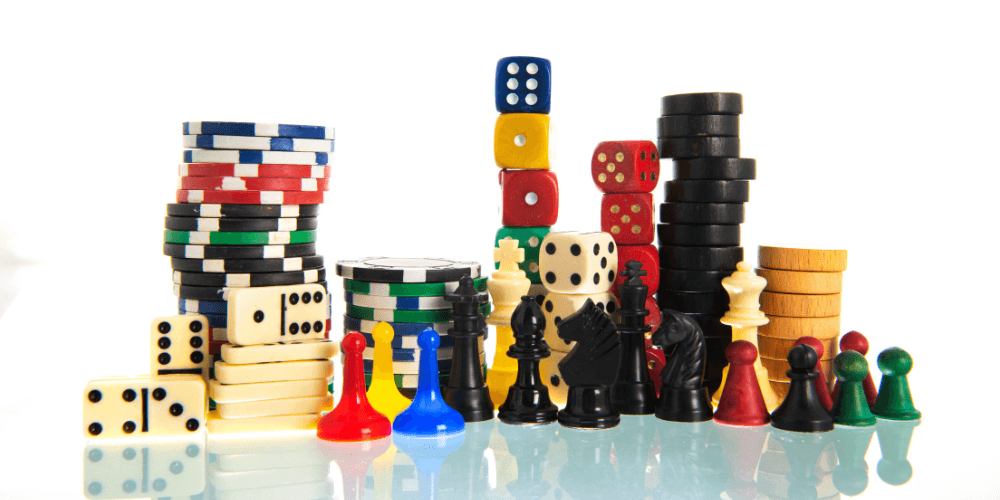Board games are timeless. They\’ve transcended cultures and centuries to become beloved sources of entertainment and social connection. In this blog, we\’ll dive into what board games are, their daily uses, their advantages and disadvantages, their fascinating evolution, and how they impact our world.
What is a Board Game?
At their core, board games are structured forms of play. They typically involve:
- A board: A designated playing surface with marked spaces, paths, or regions.
- Pieces: Movable markers, counters, or figures.
- Rules: A defined set of instructions governing gameplay, objectives, and outcomes.
- Players: Two or more participants.
Board Games: Their Daily Uses
Board games find purpose in numerous areas of daily life:
- Entertainment: A primary use, board games provide hours of fun and amusement.
- Education: Games can teach skills like strategy, problem-solving, math, vocabulary, and history.
- Socialization: They foster interaction, communication, and create shared experiences.
- Family bonding: Playing together strengthens bonds and creates lasting memories.
- Therapy: Games can be used for cognitive stimulation, emotional regulation, and social skill development.
Advantages of Board Games
- Cognitive Benefits: Board games challenge critical thinking, decision-making, and memory.
- Stress Reduction: Games provide a healthy distraction and encourage relaxation.
- Social Interaction: They facilitate meaningful face-to-face communication.
- Adaptability: Most games offer varying levels of complexity to suit different ages and skill levels.
- Accessibility: Many board games are affordable and accessible to learn.
Disadvantages of Board Games
- Time Investment: Some games can take hours to complete.
- Potential for Conflict: Competitive games might lead to frustration or arguments.
- Setup and Cleanup: Games with many components require additional time for preparation and tidying up.
- Space Requirements: A dedicated playing area may be needed, especially for more giant games.
How Board Games Impact the Real World
The influence of board games extends far beyond game night:
- Economics: The board game industry is a significant economic sector, generating revenue and jobs.
- Pop Culture: Iconic games like Monopoly and Scrabble permeate popular culture and language.
- Inspiration: Board games inspire adaptations into movies, TV shows, and digital games.
- Community Building: Game cafes, conventions, and clubs create vibrant communities worldwide.
- Innovation: They drive constant innovation in game design and mechanics.
The Evolution of Board Games
Board games boast a rich history spanning millennia:
- Ancient Origins: The earliest games like Senet (Egypt) and the Royal Game of Ur (Mesopotamia) emerged thousands of years ago.
- Medieval & Renaissance: Chess (India) and Backgammon became popular across Europe, evolving over time.
- 19th Century: Games like Snakes and Ladders and Parcheesi found widespread appeal.
- The Rise of Monopoly: In the 1930s, Monopoly\’s focus on real estate captivated audiences and solidified its position as an icon.
- Post-WWII Boom: Classics like Scrabble, Risk, and Clue emerged, shaping modern board gaming.
- The German-Style Revolution: In the 1990s, Settlers of Catan pioneered the \”Eurogame\” movement, emphasizing strategic depth and minimizing luck.
- The Modern Era: Crowdfunding platforms enable independent designers, leading to a vast and innovative board game landscape.
The Power of Real-World Examples
Using real-world examples illustrates board games\’ concepts effectively:
- Monopoly: Teaches basic principles of economics, property ownership, and negotiation.
- Chess: Demonstrates strategic thinking, planning, and predicting consequences.
- Pandemic: Highlights the importance of collaboration, problem-solving, and resource management.
- Codenames: Encourages creative word association, deduction, and teamwork.
- Ticket to Ride: Introduces network building, route planning, and resource optimization.
Choosing the Right Board Game
With the dazzling array of choices, picking the perfect board game can feel overwhelming. Here are a few factors to consider:
- Number of Players: Do you typically play with a small group, large gathering, or solo?
- Game Duration: Do you prefer quick filler games or hours-long strategy epics?
- Complexity: Are you seeking casual fun or a brain-burning challenge?
- Theme: Do you love fantasy, sci-fi, history, or abstract concepts?
- Mechanics: What appeals to you? Dice rolling, card drafting, worker placement, tile laying, and more!
Tips for Enhancing Your Board Game Experience
- Set the Mood: Create a comfortable atmosphere with snacks, drinks, and background music.
- Be Patient: Take time to learn rules, especially with complex games.
- Focus on Fun: Embrace laughter and good-natured competition over strict adherence to regulations.
- Try New Games: Explore diverse genres and styles to keep things exciting.
- Join a Community: Find local game groups or online forums to discover new games and fellow enthusiasts.
Conclusion
Board games are more than just a way to pass the time. They provide opportunities for intellectual stimulation, social connection, and unadulterated fun. Their evolution, from the hallowed halls of ancient civilizations to our modern living rooms, is a testament to their enduring appeal.
As technology advances and gaming landscapes shift, one thing is certain: the tradition of gathering around a table, rolling dice, and moving pieces will forever hold a special place in our hearts.
Disclaimer
The information and opinions expressed in the above blog are for entertainment, leisure and informational purposes only. Do your own research before purchasing any board game. Always follow the age recommendations and instructions provided by the game manufacturer.


